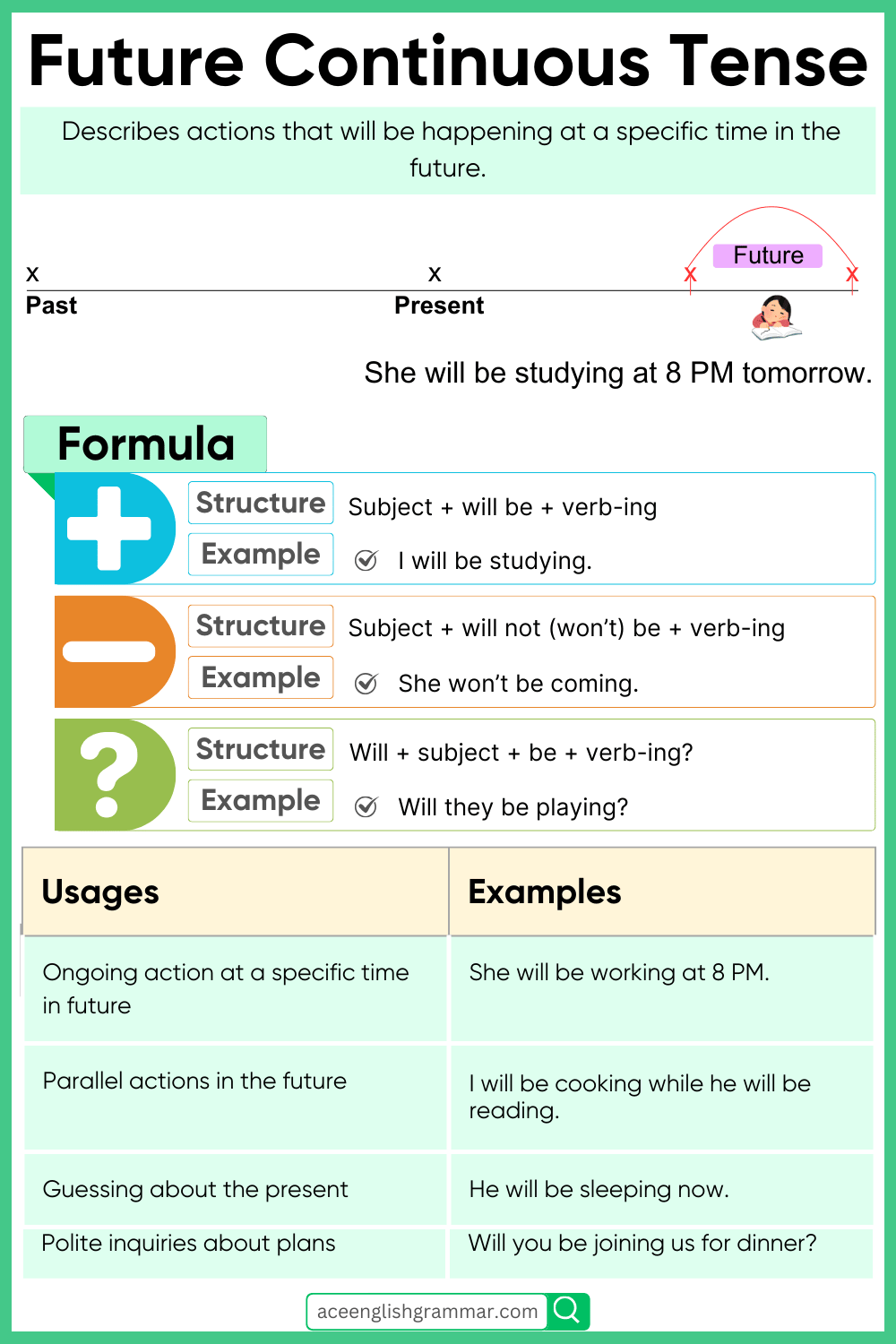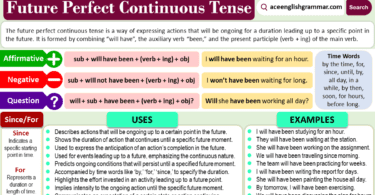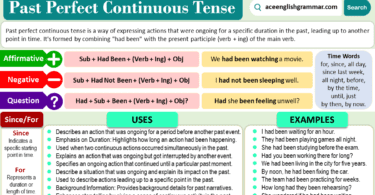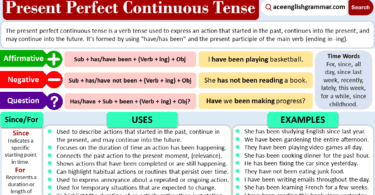The Future Continuous Tense, also called the Future Progressive Tense, describes actions that will be ongoing at a particular time in the future. It’s formed by using “will be” followed by the -ing form of the verb (present participle). This tense is especially useful when we want to talk about plans, ongoing events, or future actions that will be in progress.
Table of Contents
What is Future Continuous Tense?
The Future Continuous Tense (also called Future Progressive Tense) describes an action that will be in progress at a certain time in the future.
- We will be attending the lecture.
Positive Form (+)
To form the positive, we use “will be” followed by the verb with -ing. This indicates an action that will be in progress in the future.
- I will be working on the report tonight.
- They will be traveling to Japan next month.
- She will be baking a cake for the event.
Negative Form (-)
In the negative form, “not” is added between “will” and “be”. This shows that the action will not happen at the specified time.
- I will not be attending the meeting tomorrow.
- He will not be joining us for dinner.
- They won’t be staying at the hotel tonight.
Interrogative Form (?)
For questions, “will” comes before the subject, and the sentence ends with the verb in its -ing form.
- Will you be coming to the party?
- Will they be arriving on time?
- What will you be doing this evening?
Structure of Future Continuous Tense
Affirmative Sentences (+)
Subject + will be + present participle (verb+ing)
| Subject | Helping Verb | Example |
|---|---|---|
| I/We/You/They | will be + V-ing | We will be attending the lecture. |
| He/She/It | will be + V-ing | She will be fasting tomorrow. |
Negative Sentences (–)
Subject + will not be + present participle (verb+ing)
Examples:
- I will not be sleeping at 10 PM.
- He will not be coming to the masjid.
- They will not be playing football.
Interrogative Sentences (?)
Will + Subject + be + present participle (verb+ing)?
Examples:
- Will you be attending the class?
- Will she be cooking dinner?
- Will they be using the car?
Rules for Future Continuous Tense
- Forming the Tense:
Combine “will be” with the verb in its -ing form (present participle).
Example: “She will be reading at 8 PM.” - Adding Not for Negative Sentences:
Insert “not” between “will” and “be” to create negative forms.
Example: “They will not be playing football tomorrow.” - Question Form:
Begin with “will”, followed by the subject, then “be” and the verb in its -ing form.
Example: “Will you be coming to the event?”
When Do We Use Future Continuous Tense?
1. To talk about an action in progress at a future time
- At 9 PM, I will be reading the Quran.
- Tomorrow at this time, we will be traveling to Lahore.
2. To describe a planned or expected future activity
- Zaid will be meeting the teacher next week.
- They will be performing Umrah in December.
3. To ask politely about someone’s future plans
- Will you be joining us for iftar?
- Will they be attending the event?
Common Time Expressions Used
| Expression | Example |
|---|---|
| At this time tomorrow | I will be driving to Islamabad. |
| Next week/month/year | She will be studying next week. |
| In the morning/evening | We will be praying in the evening. |
| At 5 PM, 10 AM etc. | He will be working at 10 AM. |
| This time next week | They will be staying in Makkah. |
Examples of Future Continuous Tense
Affirmative (+)
- I will be learning Arabic at this time tomorrow.
- Amina will be preparing for her test.
- They will be arriving soon.
- We will be leaving for the airport.
- He will be fixing the laptop.
Negative (–)
- I will not be watching TV tonight.
- She will not be cooking today.
- We will not be joining the class.
- Bilal will not be helping his brother.
- They will not be driving at night.
Interrogative (?)
- Will you be attending the lecture?
- Will she be reading the book at 9 PM?
- Will we be staying at the hotel?
- Will they be taking the test?
- Will Hamza be leading the prayer?
Common Mistakes and Corrections with Future Continuous Tense
- I will be go to school. ❌
- I will be going to school. ✅
- She will be cooks dinner. ❌
- She will be cooking dinner. ✅
- Will you be comes late? ❌
- Will you be coming late? ✅
- He will not be goes tomorrow. ❌
He will not be going tomorrow. ✅
- We will be study tonight. ❌
- We will be studying tonight. ✅
Future Continuous vs Future Simple
| Feature | Future Simple | Future Continuous |
|---|---|---|
| Action Type | One-time or completed action | Ongoing action at a specific future time |
| Structure | will + base verb | will be + verb+ing |
| Example | I will read the Quran. | I will be reading the Quran at 9 PM. |
Future Continuous Tense Exercises
Fill in the blanks:
- He ______ (not attend) the meeting.
- ______ she ______ (stay) at home tonight?
- They ______ (travel) at this time next week.
- We ______ (watch) a movie tonight.
- I ______ (sleep) at 11 PM.
Answers:
- will not be attending
- Will, be staying
- will be traveling
- will be watching
- will be sleeping
FAQs
It’s a verb tense used to describe actions that will be ongoing at a specific time in the future, formed by “will be” plus the present participle of the verb.
We use it to talk about future actions that will be in progress at a particular moment or time in the future.
In positive sentences, use “will be” followed by the -ing form of the verb. For negative sentences, add “not” after “will”.
Yes, time expressions like “tomorrow at this time,” “next week,” or “at 5 PM” are commonly used.
I will be working late tomorrow.
Will you be attending the meeting tonight?
Read More





Leave a Comment